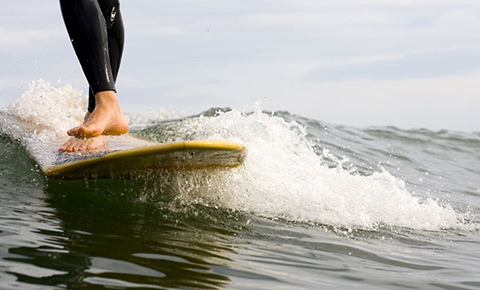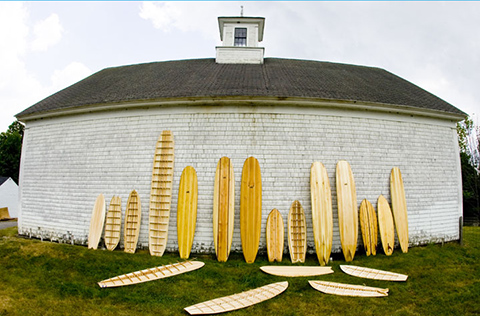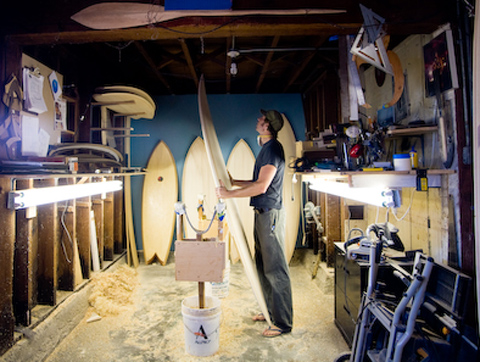Sep 06 2008
Return to Grace: Wooden and Environmentally Sustainable Surfboards
I bought a magnificent quad fin fish last year. Surfs beautifully, sadly it won’t last. It’s a fiberglass board glassed with light fiberglass probably for high performance. Within a couple session, the deck had visible dents on it and I had to apply another layer of glass and resin to it. Fiberglass boards are the one-hit wonders of surfboards. They’re great for a few months, but die out after that, losing pop and gaining weight from dings. Within a year of consistent surf, if they’re not already broken most traditional fiberglass surfboards are done at a high environmental costs. Nothing can be recycled with fiberglass boards, they’re made with toxic chemicals, and production of the blanks, resin, and fiberglass requires petrochemicals and outputs a significant amount of CO2 into the atmosphere. Simply, the system is broken. It was born broken.
Fortunately, there are more sustainable options becoming available. Ecowarrior, Joe Santley, started the company ReSurf along with support from Lost surfboards to begin recycling surfboards (ask your local surfshop that they begin participating). The ReSurf website explains more about the project and list nearby locations. Greenlight Surfboard Supply makes Bamboo fins and other sustainable surfboard materials.
Country Feeling Surfboards is a company building surfboards out of these sustainable materials. “Country Feeling Surfboards celebrates the nature that surrounds us with surfboards made with environmentally friendly materials: soy-based and sugar-based foams; deck inlays made from hemp, organic cotton, bamboo and silk; and resin that is catalyzed by the sun.”
What seems like the best option is the resurgence of wooden surfboards. The entire process is sustainable. They’re locally buily, often using local materials, the strong and long lasting. After years and years of use, when it comes time to retire them they’re completely recyclable. The wood can be reused or composted. They’re expensive but if you consider a fiberglass is likely to have a 1/4 the lifetime of a good wooden board and that many wooden boards may last a lifetime then they’re simply good investments.
Grain Surfboards are based in York, Maine and build beautifully crafted, hand shaped wooden boards. Hess Surfboards is based in Ocean Beach, San Francisco and also build hand shaped wooden boards. For the deck and bottom of the board, Hess uses sustainably farmed poplar and red cedar (salvaged from local Victorian homes). For the rails he uses cork and for the fins, bamboo. A small amount of expanded polystyrene (EPS) foam. Boards start around $1300. A look through their gallery will be enough to convince you. The Surfer’s Journal has written features on both of them. Timberline Surfboards offers wooden surfboards shaped out of Santa Barbara, CA.


